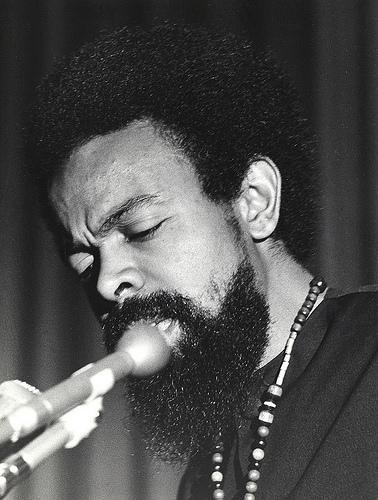
LeRoi Jones. Credit: Chicago Urban League Records, University of Illinois at Chicago Library. Photo by UIC Digital Collections via Flickr/Creative Commons
I forgot the Golden Globes were on tonight, and I tuned in just in time to see Kerry Washington not win an award for best actress in a television drama. I turned to social media to see what I had missed, and Black Twitter told me, using its classic wit, that black folks hadn’t won anything. (Black Twitter also retweeted Mia Farrow’s equally witty shade towards Woody Allen. And to my shock, after watching Steve McQueen not win for best director, 12 Years a Slave was named Best Motion Picture – Drama as I was composing this post. Nonetheless, I stand by everything I’m about to say.) I had suspected what Black Twitter told me as the camera spanned the Golden Globes audience. Black talent was sprinkled throughout, but it looked overwhelmingly white.
This reminded me of something I came across months ago. When researching the Black Arts Movement, I read about “The Kerner Report,†a 425-page document commissioned by President Lyndon B. Johnson that tried to explain why civil disorders were erupting in black neighborhoods in major cities. (A civil disorder happened here in Louisville, too, but it was in May of 1968, after The Kerner Report was released.) President Johnson had wanted to know the mass media’s effect on “the riots.†As Lisa Gail Collins and Margo Natalie Crawford wrote in their introduction to the book, New Thoughts on the Black Arts Movement, The Kerner Commission:
was less troubled by the actual riot coverage than by the pervasive lack of coverage of the daily complexities of black life. Concerning this palpable lack, the report found that mainstream newspapers and television programming neglected both African American subject matter and viewers. The report stated: ‘They have not shown understanding or appreciation of—and thus have not communicated—a sense of Negro culture, thought, or history. … The world that television and newspapers offer to their black audience is almost totally white, in both appearance and attitude.’
The report was no surprise to Black Arts Movement founders and leaders. As Collins and Crawford noted, “LeRoi Jones had characterized American television as ‘a steady deadly whiteness beaming forth.’†He said this in 1966.
Jones would later rename himself Amiri Baraka. I actually meant to write a blog post about this when I first read it months ago, but the timing may be better now. Amiri Baraka died on Jan. 9, 2014. Had he lived to see another Golden Globe awards night, he might have echoed @prisonculture’s tweet: “I’m going to rename the #GoldenGlobes as ‘the Unbearable Whiteness of Being.’†Maybe the poet is in some revolutionary heaven where he can continue to watch American television and movies, but considering he would see the same thing he saw in 1966, I guess that would be revolutionary hell.
And that’s what’s frustrating to me. Not that black actors and actresses didn’t win big, but that Baraka’s words from 1966 and a government report from 1968 are both still so true. We don’t have to depend on mainstream media to show us “the daily complexities of black life,†but in a country that’s going to be majority “minority†soon, why aren’t we the mainstream?
